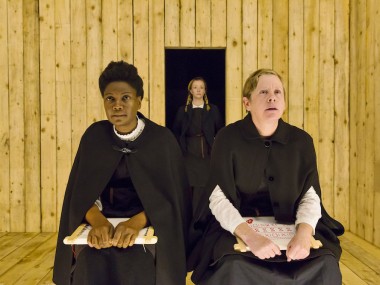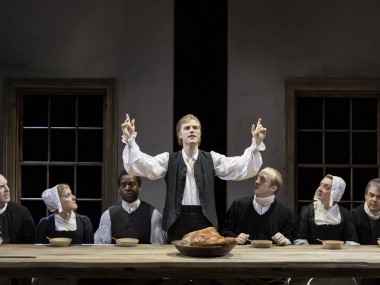Gunter, Royal Court
Wednesday 17th April 2024

Readers who don’t think much of football won’t be surprised to hear that this tale of murder and misogyny started off with ugly scenes at a match. Okay, not a regular Premiere League fixture of today, but a much more anarchic game which took place about 420 years ago. This particular free-for-all results in a witch trial, a fascinating episode of history brought to life in a pulsating piece of gig theatre by Dirty Hare. Co-created by Lydia Higman, Julia Grogan and Rachel Lemon, this award-winning production of Gunter comes to London following its sell-out run at the Edinburgh Fringe Festival last year. Although it runs at only about 70 minutes, the show packs a powerful punch.
The story, based on true historical events, goes like this. In 1604, in North Morton, a small village outside Oxford, there was a football match played, according to the conventions of the time, with very few rules (film of today’s wildly violent Ashbourne Shrovetide football match is projected on a screen before the show begins). During the 17th-century affray, Brian Gunter, the wealthiest and most powerful yeoman of the locality, kills two boys. Brought to trial, he is acquitted. Their mother, Elizabeth Gregory, complains about this injustice and, when Gunter’s daughter, Anne, begins to act oddly, he is convinced that Elizabeth has bewitched her. Enlisting the help of other worthies, Gunter prosecutes her for witchcraft — which carries the death penalty.
This rather obscure episode from the archives, which also features King James I, who had a noted interest in witches (cue a quick nod to Macbeth), is given a refreshingly vigorous production. The cast of three — Grogan, Hannah Jarrett-Scott and Norah Lopez Holden — represent all the 20 roles while dressed in white football gear, while Higman — a historian who researched this case — also plays guitar, drums and banjo. On a bare white stage the actors use props like portable lamps, mics, animal heads, cowboy hat, buckets and various liquids to create the feel of energetic spontaneity which is the show’s appealing hallmark. There is little attempt to summon up the language of the past, and the modern vernacular clashes effectively with the strangeness of 17-century ideas and beliefs.
This gives vivid clarity to the themes of this highly entertaining show: as the opening a cappella song, with its repeated refrain of “the bad man” and “Oh Lord he’s bigger than me”, illustrates, the main preoccupation is with showing how masculinity, when backed by wealth and the law, has a terrifying power that is used to subject women. However innocent, thousands of women were accused of witchcraft in the 17th century and most of them were hanged. This screaming injustice provides a really good sense of tension in the show, as I did not know whether Gunter would be successful in his persecution of Elizabeth, and two other women. As it is, the men in the story are all hard, even those who are sceptical of the existence of witches, and the women are at their mercy.
At the same time, as in many discussions of witchcraft and other olde beliefs, there is a sense that these ideas about the supernatural were also a form of female empowerment as well as symptomatic of men’s fear of women’s bodies (at first Anne’s odd behaviour is put down to her “monthly bleeds”). Anne is an ambiguous character: does she really vomit pins and levitate? And for what reason? Her strange behaviour might be the result of family tensions, maybe an effort to act out her father’s fantasies to please him and protect them all from the accusations of murder by Elizabeth, or maybe a simple fraud that both father and daughter cooked up to get rid of a troublesome neighbour.
Along with these serious issues, there are lots of comic lines and visual gags. The show’s a hoot. Its jokey approach to the story means that the occasional moments of shock come across more powerfully. What I particularly like is the fact that the storytelling is unpredictable. Until the very end, you never know how things are going to turn out, which gives the tale its dramatic tension. The intervention of the historian also emphasizes, like Tom Stoppard’s Arcadia, the limits of your knowledge of the past. Since most record keeping was done by officials, men who were concerned with formal records, the evidence always leaves gaps that cannot be filled. This radical uncertainty is likewise emphasized by the feminism of the piece. The past is made by men; Anne’s story is hidden history.
Lemon’s production is energetic and engaging, with Anna Orton’s simple set and plain backcloth, on which are projected the key points of the story. The acting is committed and versatile, with the actors playing the main protagonists — Elizabeth (Grogan), Anne (Holden) and Brian (Garrett-Scott) — as well as countless other parts. It’s well focused, and messy in a good way. The music, played live onstage by Higman, who also narrates the history, is a beguiling mix of incantation, blues, country & western, and rock chords. Although not very sophisticated, it does carry a kind of happy charm. You leave the venue with an ear worm sticking to your mind.
Much as I enjoyed the performance, I do wonder what this show is doing at the Royal Court, which was once a writer’s theatre and has now become — in the hiatus between artistic director Vicky Featherstone’s departure and the start of of David Byrne’s first season next month. — a receiving house for an RSC show, Cowbois, and now this Edinburgh transfer (which would probably have been a better fit at the Soho Theatre). While I look forward to Byrne’s programming, I hope that he does not give up totally on the Court’s historic identity. In the meantime, there’s Gunter, a serious show about misogyny, grief and trauma that is simultaneously frisky, funny and, yeah, fab.
© Aleks Sierz




